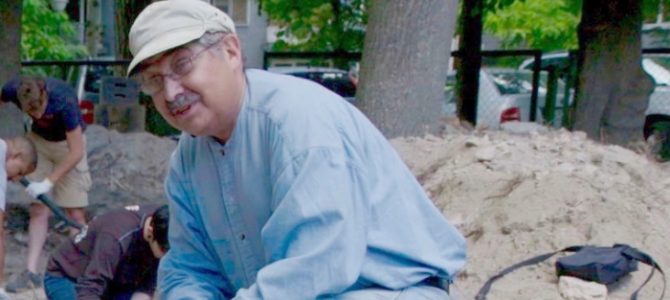(Miami, July 7, 2019)—This summer a team from the University of Hartford is working to locate the lost shtetl of Rumšiškės (Rumsheshok) in Lithuania, which is now located under Lake Kaunas. Home to approximately fifty Jewish families who were massacred in 1941, the village was abandoned and the Soviets later created a dam, resulting in the village’s remains now being under water. Filming throughout the process will document the work, which will result in a documentary film, museum exhibitions, and presentations in Lithuania and the U.S. Targum Shlishi’s grant is helping to support the five-person student team, which is led by archaeologist Richard A. Freund, a professor at the University of Hartford who has headed the university’s Vilna Excavation Projects for the past four years.
Project Background and Scope
“This is a unique program for students to work on. The students will document our summer excavations and create a documentary film that will show our underwater search for the lost village of Rumshishok,” Freund explains. “We will be working with high-tech, robotically-operated vehicles and professional divers to find the village and we will work with our ground penetrating radar equipment to identify the location of the mass grave of the Jews of Rumshishok which will ensure that no future development can take place at that site.”
The village is located approximately twelve miles from Kaunas (Kovno), and is close to the open-air Lithuanian Folk-Life Museum. Professor Freund is working with the museum to contribute Jewish material to the museum’s exhibitions in order to more fully represent the role of the Jews in historical Lithuania.
Disseminating Information
In addition to contributing material to the Lithuanian Folk-Life Museum and to creating the documentary, the work will also be presented in an exhibition at the University of Hartford. This work is related to several other projects that Professor Freund has worked on with colleagues and students to locate and map Holocaust sites across Europe. Some of his recent projects have garnered international attention. He worked on the team that located the Holocaust escape tunnel in the Ponar forest (which was documented in NOVA program that has been seen by more than 10 million people). Other projects have included excavating the Great Synagogue of Vilnius and locating the roadside grave of the young Jewish poet Matilda Olkin and her family, who were murdered in 1941.
Preserving History
“Professor Freund’s work in this field is remarkable on so many levels. He is motivated by a desire to uncover and preserve Jewish history. He brings cutting edge, noninvasive technology to these historical sites in order to learn the truth about Jewish history and especially the Jewish experience during the Holocaust and to share it with the world,” says Andrea Gollin, program director of Targum Shlishi. “He is integrally involved in acquiring loans of equipment, assembling teams of colleagues, and involving students extensively and to a degree that many would not even think to do, but he has a deep commitment to exposing students to these incredibly meaningful learning experiences.”
Targum Shlishi has supported several of Professor Freund’s past projects, including his work on the Holocaust escape tunnel and on finding the burial site for Matilda Olkin.
About the Maurice Greenberg Center for Judaic Studies at the University of Hartford
Professor Freund is director of the Maurice Greenberg Center for Judaic Studies at the University of Hartford. The Center offers undergraduate and graduate students as well as members of the Greater Hartford community a broad array of learning experiences through courses, archeological digs, and international educational travel. Curriculum opportunities include studies in the history of Judaism, the Bible, world religions, the Holocaust, Israel and Hebrew, Yiddish and Arabic languages. The Museum of Jewish Civilization is attached to the Center’s activities and endowments; it is a full service museum of all periods with a specialty collection and exhibition in the Holocaust and genocide, cantorial music, and archaeology. For more information about the Center, visit its website.
About Targum Shlishi
Targum Shlishi, a Raquel and Aryeh Rubin foundation, is dedicated to providing a range of creative solutions to problems facing Jewry today. Premised on the conviction that dynamic change and adaptation have historically been crucial to a vibrant and relevant Judaism and to the survival of its people, Targum Shlishi’s initiatives are designed to stimulate the development of new ideas and innovative strategies that will enable Jewish life, its culture, and its traditions to continue to flourish. For more information on the foundation, visit its website. Follow Aryeh Rubin, Targum Shlishi’s director, on Twitter.


